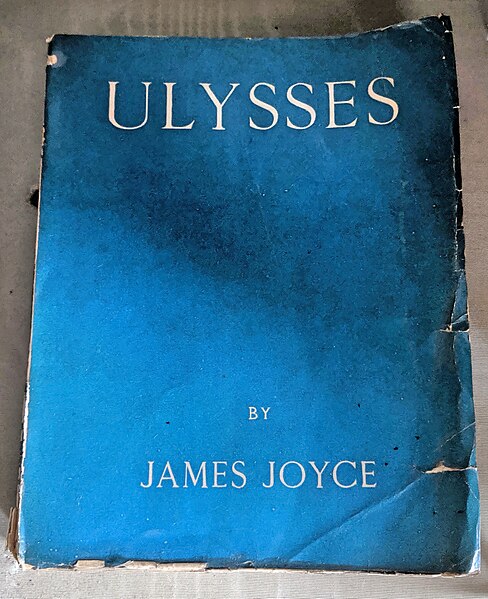
Thammasat University students are cordially invited to participate in a free Zoom event celebrating the 100th anniversary of the publication of the Irish novelist James Joyce’s Ulysses.
The Thammasat University Library collection includes many books by and about James Joyce as well as his book Ulysses.
The event will be held on Tuesday, 8 February starting at 7:30pm Bangkok time.
It is organized by the School of English, The University of Hong Kong (HKU).
Students may register to receive a Zoom link at this link.
For further information or with any questions, please write to
katiew@hku.hk
As the webpage announcing the event explains,
James Joyce’s Ulysses was published on 2nd February 1922. Ulysses is arguably the greatest work of C20th English prose fiction. On 8th February 2022 we will be celebrating the book’s centenary. Six teachers from the School of English will read extracts from the book. This is an especially relevant event for English Majors and M.A. students.

Thailand and Ulysses
TU students may recall that the noted Thai author Saneh Sangsuk, who wrote White Shadow (เงาสีขาว) (2001) and the short story Venom (อสรพิษ) (2001) was strongly influenced by James Joyce’s Ulysses. Indeed, Sangsuk, who writes under the pen name Dan-arun Saengthong (แดนอรัญ แสงทอง) has mentioned that Ulysses was one of the main reasons he was inspired to become a writer.
Ulysses follows a character, Leopold Bloom, through a day in Dublin in June 1904.
Ulysses is the Latin version of the name of Odysseus, the hero of Homer’s epic poem The Odyssey.
James Joyce’s novel offers parallels between Homer’s poem and the events in the novel. Because Joyce read so widely and was so interested in world literature and history, it is not surprising that Siam is mentioned in Ulysses.
One of the characters in Ulysses, Stephen Daedelus, who is modeled after Joyce’s own experience, is bored when he is teaching a class. His mind wanders back to his student days when he read books at the Bibliothèque Sainte-Geneviève in central Paris, France:
Aristotle’s phrase formed itself within the gabbled verses and floated out into the studious silence of the library of Saint Genevieve where he had read, sheltered from the sin of Paris, night by night. By his elbow a delicate Siamese conned a handbook of strategy. Fed and feeding brains about me : under glowlamps, impaled, with faintly beating feelers : and in my mind’s darkness a sloth of the underworld, reluctant, shy of brightness, shifting her dragon scaly folds. Thought is the thought of thought. Tranquil brightness. The soul is in a manner all that is : the soul is the form of forms. Tranquillity sudden, vast, candescent: form of forms.
The verb conning means to examine carefully; study, commit to memory, or learn.
So when Stephen Daedelus was preparing his class assignments in a Paris library, nearby someone from Siam was examining a book about military strategy.
According to one researcher,
Siam, or Thailand, was, and is to this day, famous for being the one country in Southeast Asia never to have been colonized, invaded, or co-opted by a European power. This fact, as remarkable in Joyce’s time as it is in ours, was attributed to the political canniness and maneuverings of Thailand’s two monarchs from 1851 to 1910, Mongkut and Chulalongkorn. Quite aside from Stephen’s and Joyce’s general fascination with cultural “other- ness,” Siam has a politically symbolic resonance that cannot be overlooked in this context: like Switzerland (where Joyce was living), it was politically neutral; unlike Ireland, it was politically independent… the immediate associations of the phrase “conned a handbook of strategy” may reasonably be said to be political or military. Putting all this together, we come up with the following formula: to preserve the political neutrality and independence of a homeland, the Siamese must travel abroad and study strategy in Paris. In Stephen’s mind, then, the integrity of home is preserved not by the expulsion of parasites and traitors but by a participation in the foreign or strange-by a venture outside the home… Correctives to traditional authority enter the room from a shout in the street, and Siamese independence is maintained by strategy conned outside Siam, in Paris. The outside corrects and revises the inside and becomes a stable value of its own, making cultural exploration desirable and isolationism repugnant. This ostensibly organic ideal of inclusion and totalization is rein- forced by perhaps the most obvious Siamese connection of all-the implication that the delicate student is Stephen’s spiritual Siamese twin. Yet the dialectical process does not end here. Even Stephen’s model of political cosmopolitanism is subject to ironic reversals. From Joyce’s biographers Herbert Gorman and Richard Ellmann, we learn that Stephen’s memory of a “delicate Siamese” is based not on a historical Siamese but on a Cambodian acquaintance of Joyce’s, Rita Rasi – a Khmer prince from a French protectorate neither independent nor neutral. And, as it turns out, whatever “strategy” Rasi was reading is un-likely to have been political, since he apparently had no desire to return to his recently (1863) colonized Cambodia and ended up practicing medicine in rural France… In the phrase “conn[ing] a handbook of strategy,” Stephen projects a romantic and salvational exile for the “delicate Siamese,” an exile that reinforces rather than threatens the integrity of the homeland.

But Stephen’s very figure of external authority is a historical distortion; the figure of the independent Siamese is inhabited by a colonial Khmer. And the final irony is that Cambodia’s voluntary submission to French colonial authority was intended partly to protect Cambodia against Siamese aggression. If Rita Rasi had been studying military or political strategy in Paris, his project would have been distinctly antagonistic to the Siamese. Of what interest can this biographical or historical distortion be for the reader of Ulysses? There is, of course, the possibility that “Siamese” might have been understood as a casual generic term for “Indochinese.” But at what point would this substitution have occurred in the signifying chain? In the idiom of 1903 Paris? (An unlikely confusion, since Cambodia was a French protectorate, while Siam had for ten years been on the verge of war with France. In Rita Rasi’s presentation of himself? (Even more unlikely, given the centuries-old antagonism between the culturally distinct Siamese and Cambodian peoples and the recent antagonism between France and Siam.) As a slip or an idiosyncratic aestheticization of Joyce’s? As a slip of Stephen’s? As a slip of biographical scholarship? Joyce’s letters make no reference to Rasi, so we have no firsthand account of Joyce’s assumptions about the Cambodian’s nationality. Ellmann’s account refers us to Gorman’s, and Gorman’s does not provide sources. But Gorman does not refer to Rasi as a Siamese, and one can only infer that Ellmann’s reference to Rasi as Joyce’s “Siamese” companion in the Saint Genevieve library represents a projection of Ulysses back onto Joyce’s biography. In a way this projection breaks down yet another of the interior/exterior distinctions that Joyce seemed so determined to call into question, the distinction between history (both personal and cultural) and myth or fiction. If Rita Rasi had strayed long in a foreign land by the time Ulysses was being written, Joyce also knew that the phrase “delicate Siamese” would appear to readers to have strayed from any determinable reference in the text of Ulysses. That it has strayed – in the subsequent texts Joyce quite explicitly hoped to generate-between two national identities, two homes, and, in fact, two attitudes toward home, is an irony fully prepared for by Joyce’s own writing. It is perhaps a grim historical irony as well, since it has encouraged the substitution of a generic Indochinese “otherness” for the single culture of the region that successfully resisted integration into French Indochina (a formal colonial entity comprising Vietnam, Cambodia, and Laos. The figure of the “delicate Siamese,” in both the text of Ulysses and the texts generated by Ulysses, is thus hopelessly convoluted and self-divided, embodying many conflicting relations between patriotism and exile, freedom and submission, aggression and defense. Here, as elsewhere in Ulysses, converge the difficulties of establishing a “home” in language and a “home” in culture.

(All images courtesy of Wikimedia Commons)
